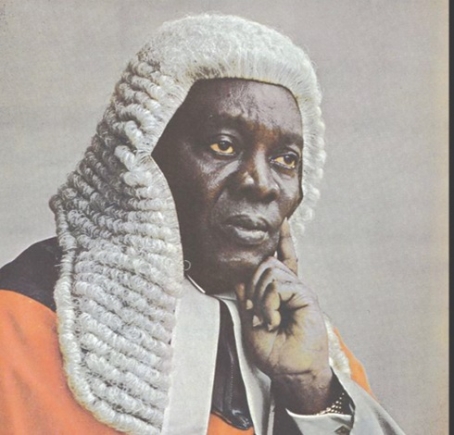There is a grounded convention in this country that I find both strange and rather ironical, which says that judges are not supposed to respond publicly to attacks or criticisms directed at them, whether of their work or against their person.
At best, they are supposed to grit their teeth and soldier on.
Given that their core mandate as judges entreats them to hear the other side in all litigation matters, it is ironic that they are effectively denied what they dispense.
Historical trend
In the decades since independence, our Judiciary has not been far away from the screaming headlines, especially in relation to political issues.
Under the first republic, back in 1963, President Nkrumah removed Chief Justice Sir Arku Korsah following the Supreme Court’s ‘Not Guilty’ verdict over the Kulungugu bomb treason trial.
Prior to that, in 1961, the landmark Supreme Court case of Re Akoto and Seven Others was decided with respect to the lawfulness or otherwise of the detention of Baffuor Akoto, the Asantehene’s linguist and others, under the Preventive Detention Act (PDA).
The second republic under Prime Minister Busia had its infamous moment with the Prime Minister’s infamous ‘no court’ outburst following the Sallah v Attorney General (aka Apollo 568) case, which the government lost.
Under the third republic, the landmark Tufuor v Attorney General case came on the back of the controversial rejection by Parliament of the then Chief Justice, Fred Apaloo.
The Rawlings revolution witnessed the dastardly abduction and subsequent gruesome murder of three high court judges in 1982, an act that shook the Judiciary in particular and the nation at large.
Public tribunals took centre stage in the dispensation of justice, however, defined.
The fourth republic, ushered in by the 1992 Constitution, has also featured the Judiciary in several controversial and highly charged political situations.
In the nascent stages of the republic, these included the plethora of cases won by the then opposition New Patriotic Party (NPP) against the National Democratic Congress (NDC) government of JJ Rawlings on several issues, ranging from the 31st December holiday to public order and GBC broadcasts.
The famous ‘page 28 case’ also generated quite some heat and in August 1998, Haruna Attah, the editor of The Weekend newspaper, was jailed by the Court of Appeal alongside Kweku Baako, the editor of The Guide, after being found guilty of contempt in a matter relating to the then First Lady, Mrs Nana Konadu Agyemang Rawlings.
Under President Kufuor, the famous ‘Fast Track’ case, the verdicts in the Ya Na, Ghana@50, Tsatsu Tsikata and other various trials all caused varying degrees of uproar directed at the Judiciary.
During President Mills’s tenure, the remark by the then NDC national chairman, Dr Kwabena Adjei, to the effect that ‘there are many ways to kill a cat’ when alluding to ‘cleaning up’ the Judiciary, caused quite a political row concerning judges.
Given the unfortunate murder of judges back in 1982 when the party’s founder, Chairman Jerry Rawlings, was the head of state, the heat was quite understandable.
In a rare move, the Association of Magistrates and Judges of Ghana (AMJG) issued a statement in August 2010 condemning the comment.
The Woyome case also provided huge political mileage for the then-opposition NPP as it meandered through the courts.
Then there was the Jake Obetsebi Lamptey bungalow case.
President Mahama’s first full term saw three major unprecedented judicial landmarks in the public square ― the 2013 election petition, the ‘Muntie 3’ contempt case and the judicial scandal involving goats and yams.
The first two cases had huge partisan political streaks, whilst the judicial scandal adversely impacted public confidence in the Judiciary and subjected it to ridicule.
Under President Akufo-Addo, the 2021 election petition again split public opinion along partisan lines.
Several politically charged cases, including the Delta Force, Opuni, Domelovo, SALL, Cecilia Dapaah, birth certificate as proof of nationality, Afenyo Markin cases among others, have thronged our courts for resolution, with a lot of flak in the process.
Currently, Chief Justice Torkornoo is facing impeachment, again with public opinion split largely along existing partisan fault lines.
Beyond political cases
Given our highly political landscape, it is perhaps not too surprising that almost everything in this country is seen in many cases through the prism of political partisanship.
To the extent that court cases touch on political issues, the Judiciary certainly will take on some heat, which, unfortunately, many may use in seeking to define the institution.
But this does not undermine the fact that away from the harsh lights of the political arena, the vast majority of cases the Judiciary deals with up and down the land are quite humdrum, ranging from cassava and plantain thefts through compound house quarrels all the way to matrimonial, land, commercial litigation and others, essentially holding society together in adjudicating the inevitable disputes that are part of the human condition.
It is easy to take this for granted and horrendous to imagine a society without adjudicating functions.
‘Might is right’ would be the natural consequence.
Interestingly, even in the military and so-called revolutionary eras, whilst institutions like the legislature were dissolved, the courts remained open, even if in the revolutionary era in particular, public tribunals were introduced as an extra layer.
Despite the politically tainted cases that find their way into the courts being in the minority, it appears that the heat in the political bear pit is such that our courts appear tarred by some with the rather brittle brush of politically charged cases that find their way there.
Next week, I will attempt to delve into the realities of our courts, from which some of our fellow citizens labour in their efforts to bring justice to us. Stay tuned.
Rodney Nkrumah-Boateng.
E-mail: rodboat@yahoo.com

